July 21, 2022 · 17 min read
Chief of Staff: A Golden Ticket to Organizational Success

Mary Nour

Chief of staff is a role that started in the military and government, and now, we can see it in most industries and sectors. While there is no one-size-fits-all when it comes to describing the duties of a CoS, their primary duties are making time, information, and decision-making more effective.
In other words, a CoS helps executives become the best version of themselves.
What is a chief of staff?
The simple definition of a chief of staff is a person who acts as the right hand to executives, including presidents, vice presidents, heads of departments, and chief executive officers (CEOs).
The role of the chief of staff is not about dealing with administrative tasks only (e.g., executive assistant). A CoS does not manage the leader’s day-to-day schedule. The chief of staff is a leader. He/she makes high-level decisions, strategizes processes, and sets policies through devising meaningful plans and generating useful ideas, anticipating problems, and coming up with new solutions.
The chief of staff's responsibilities are similar to those of the CEO, but their role is not as employee-facing.
What are the other titles for chief of staff?
Alternative titles for CoS are as follows:
- Chief Business Officer
- Chief Business Administrator
- Staff Director
- Chief Administrative Officer
- Chief of Personnel
- Personnel Manager
What does a chief of staff do?
The Harvard Business Review cites Patrick Aylward, vice president and CoS at Horizon Blue Cross Blue Shield of New Jersey, who breaks down the job into five categories. And we have not read anything more comprehensive.
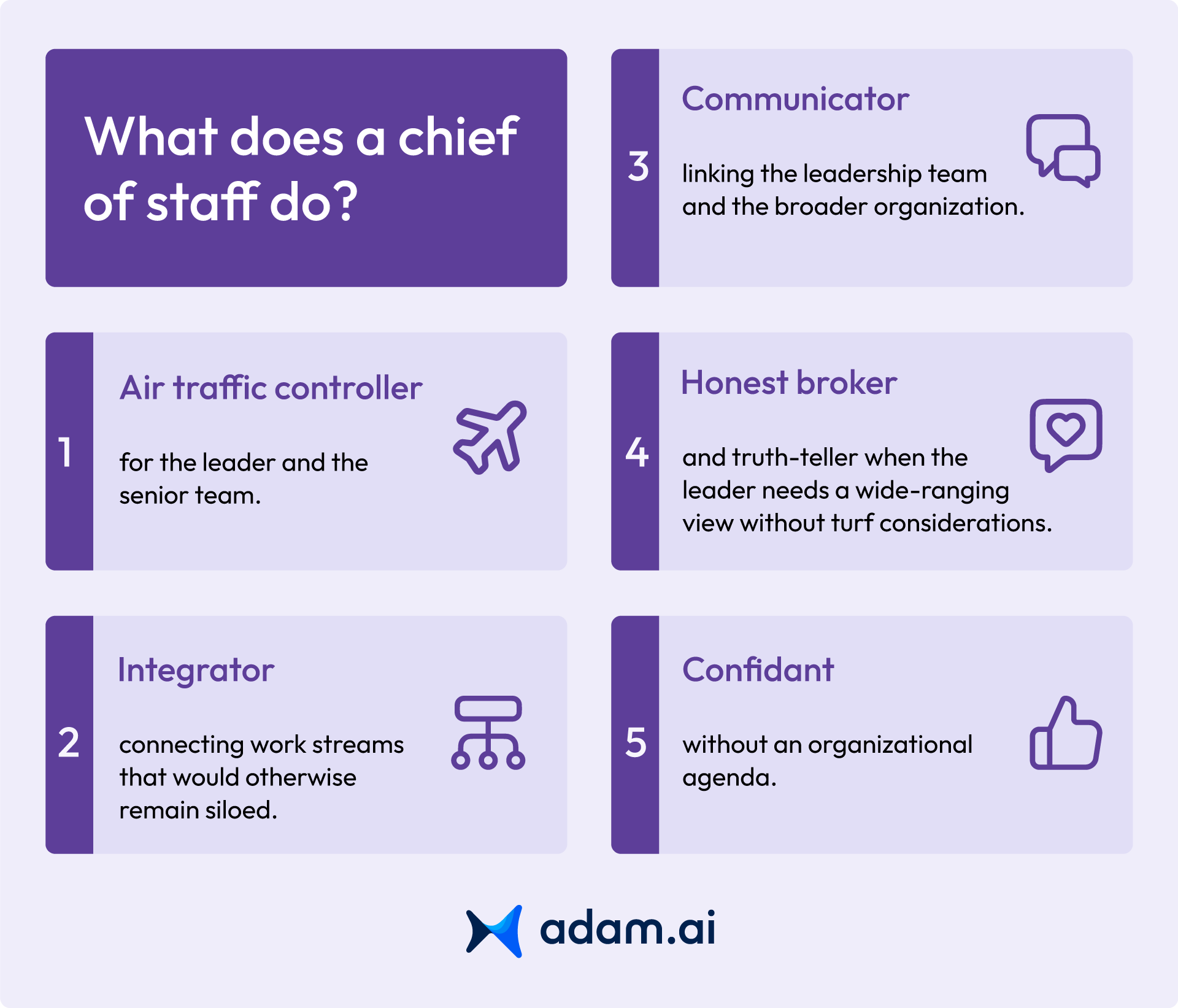
What are the responsibilities and duties of a chief of staff?
So, let's discuss how the above five categories can be translated into tasks and duties.
According to HBR, there are three levels of challenges a leader will encounter, upon which a chief of staff's responsibilities are decided. The three levels are as follows:
Level 1: Maximize efficiency with minimal change
Level 2: Implement the existing strategy with only moderate change
Level 3: Execute significant strategic, operational, and cultural agendas calling for considerable changes
In level 1, the main responsibility of CoS is to help the leader stay organized, which will allow them to give time to more important items.
This requires a good understanding of the business, effective communication skills, and the ability to manage projects and relationships.
In level 2, the main responsibility of CoS is the excellent management of important projects. Besides level 1 requirements, CoS should be able to simplify complicated tasks, strategic thinking and problem analysis are one of their strongest suits, and they should know how to see things through, from idea to execution.
In level 3, the main responsibility of CoS is to help top management navigate through uncertainty and risk. This requires the skill to anticipate and avoid problems, add value to the leader’s vision, and be intelligent on the organizational and political levels.
What are the main responsibilities of chief of staff?
Main responsibilities differ according to each level; check out this video to discover what the job of a CoS entails.
- Managing the CEO’s schedule
- Responding to inquiries on behalf of the CEO
- Scheduling, preparing, and coordinating effective meetings, where they not only show up but try to work with the participants to reach consensus, overview the execution of processes, and keep the contents of a meeting focused
- Initiating and leading important projects
- Counseling and advising leaders and staff and providing insight and analysis on the company’s operations
- Determining and prioritizing business strategies in collaboration with the executive team members
- Offering recommendations and consultation to department leaders to improve work processes teamwork
- Gathering quantitative and qualitative evidence of process and project success and delivering course corrections
- Determining key performance indicators and delivering, monitoring, and communicating progress toward goals
- Providing recommendations on improvements across the organization
- Assessing risks
- Working on strategic business initiatives from ideation to implementation
- Collaborating with executive team members to determine and prioritize business strategies
- Reviewing, documenting, and revising processes
Skills and qualifications of the chief of staff
The best skill one would have for any position is being effective in getting the right things done.
In his book The Effective Executive, Peter Drucker argues that effectiveness derives from a set of five practices anyone can learn: managing time; focusing on results (what to contribute to an organization); building on strengths; concentrating on top priorities; and making effective decisions.
Prime of Chief Staff, a leading company that works on reshaping leadership to make organizations more effective, published a whitepaper that argues that the above five skills or practices are extremely useful when it comes to the chief of staff position. Here's how.
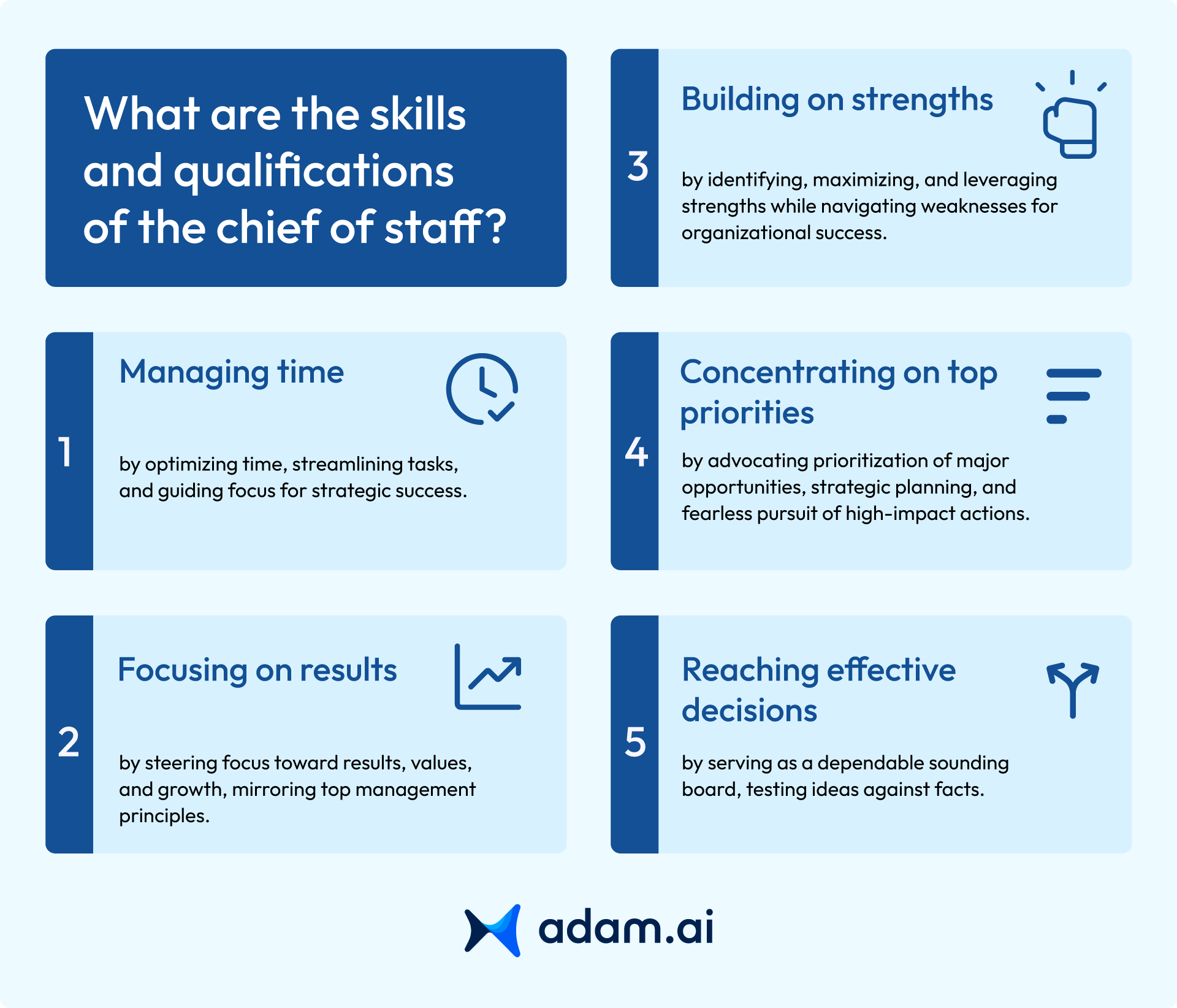
Managing time
When it comes to time, executives find it challenging to have enough of their time at their disposal and available for important matters, which do make a difference. They can get easily distracted, and leaving little time to focus on strategy is usually the outcome.
A good chief of staff helps senior executives record, manage, and consolidate time. Executives need to have large chunks of their time available and not scattered slots of time.
CoS reallocates time through doing, delegating, and deferring non-urgent tasks and cuts unproductive demands on time.
CoS helps diagnose time wastage (e.g., excess of meetings) and communicates where the executive's time should be spent to key stakeholders.
Focusing on results
Most executives focus on efforts rather than results. Drucker points out that it doesn't matter if you're top management or not. People who focus on contribution and take responsibility for results rather than focusing only on efforts are considered top management, no matter how junior they are.
An excellent CoS redirects the CEO's attention towards contribution by focusing on direct results, building values, and developing people.
Building on strengths
Executives might not be fully aware of all the available strength points (the strengths of associates, the strengths of the superior, and one’s own strengths), and, therefore, the strengths may not be professionally managed or utilized.
When making hiring decisions, executives should not focus on avoiding weakness but on maximizing strength. They should know that strong candidates always have strong weaknesses too.
Excellent CoS help executives cover the blind spots and conduct strength assessments to fully comprehend the team's strengths and how to best manage them. CoS can help redesign jobs to attract the right people and recognize those with weak performances, especially managers, and initiate action plans.
Together, the CEO and CoS can help the organization utilize each employee's strengths, regardless of their limitations and weaknesses.
Concentrating on top priorities
The need to prioritize and focus on major opportunities is the very core of an executive job. This is what delivers results. Successful CEOs need to eliminate anything that is not worth doing and concentrate on the tasks that if done perfectly will make a difference.
A successful CoS prepares and facilitates strategic planning processes and encourages executives to drop processes before they begin to decline. CoS leads or co-leads strategic initiatives and aims for what makes a difference rather than what is easy and safe to do.
Reaching effective decisions
With the chief of staff handling a considerable number of tasks, the executive will have more time to think through big decisions, with the CoS serving as a reliable sounding board by testing opinions against facts.
Without the help of CoS, the executive may make rash decisions, will not study the consequences of a decision before making one, and may be indecisive most of the time.
An effective CoS gathers different teams' perspectives to help a CEO understand the implications and helps direct the executive to make decisions only when there is a disagreement, test opinions against facts, and compare the effort done and the risk of not taking an action versus taking an action.
The advantages of hiring a CoS
The inclusion of a chief of staff in any organization with executive-level leadership can yield numerous benefits. Here are several advantages that your company can gain from hiring a skilled CoS.
Efficient time management
A chief of staff can assist with tasks and delegation to relieve executive teams from their heavy workloads, to give them additional time to focus on other critical tasks aligned with their areas of expertise.
Enhanced efficiency
A chief of staff can identify operational inefficiencies and eliminate repetitive, mundane assignments for employees, which boosts productivity and saves costs in the long run.
Informed decision-making
A chief of staff merges and analyzes comprehensive data on various aspects of the business and presents current reports during executive-level meetings. This process empowers corporate leaders to make well-informed decisions that can significantly impact the company's growth and success.
Better internal collaboration
Clear and efficient communication plays a crucial role in a company. A chief of staff can act as a conduit, connecting leaders with employees and improving communication and shared comprehension among all teams.
What are the top 5 reasons to hire a chief of staff?
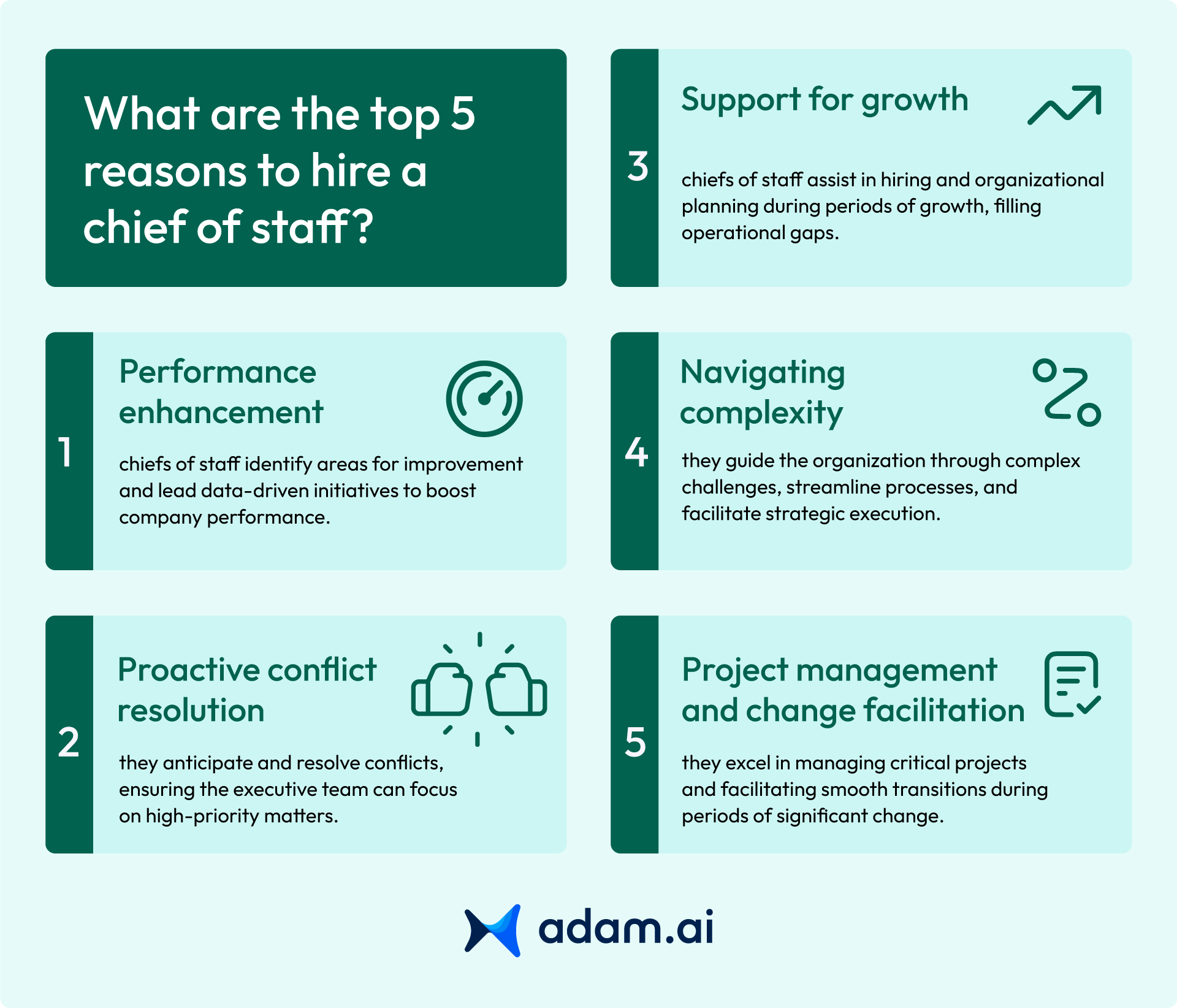
adam.ai for chief of staff: how can the chief of staff run effective executive meetings?
Holding meetings is an integral part of the chief of staff's responsibilities. Meetings represent a great demand on the executive's time, and the role of the chief of staff is to help the executive never allow meetings to become the main demand on their time.
Michelle Starr, the CEO of BE BROWN BRAVE LLC, an organization that helps chief functional Officers build more revenue by supporting women of all colors in their organizations, had perfectly put into words how crucial effective meeting management is to the position of CoS:
"To effectively manage meetings is a crucial part of the role of a chief of staff, as this chief of staff must not only manage the meeting, but the people, agenda, objective, goal, strategies, and measures.
To do this, the senior leader must ensure all relevant representatives are in the room, at the table, and participating. Meetings are designed to move the business forward with timed actions against goals.
I believe this senior leader should role model the behavior he or she is asking of their teams. When functional representatives see their leader accurately obtaining applicable data by engaging all members to provide their perspective to make his decision, they will replicate his/her behavior when he/she cannot be present at the meeting, which is the reason it is imperative to show them how to effectively manage senior-level meetings.
Capturing all perspectives not only gets him/her what they need but makes their team members feel included. Inclusion is what sparks creativity which drives innovation prompting an increase in productivity resulting in economic growth and sustainability. As we all know the main goal of the chief is to sustain and grow the business. So, effectively managing team meetings is an important job requirement for the role."
So, it's clear that holding effective and actionable meetings should be on the top of your list if you want to excel as chief of staff.
You should know that holding effective meetings is challenging. A study made by Atlassian concluded that $37 billion is the cost of unnecessary meetings for U.S. businesses.
Check out what the study found out about average meeting goers:
- 96% missed meetings.
- 39% slept during a meeting.
- 45% felt overwhelmed by the number of meetings they attended.
- 73% did other work during meetings.
- 47% complained that meetings were the number one reason time is wasted at the office.
Bonus. We've recently released "The Future of Meetings Report," where over 490 experts from various industries share their insights on challenges and AI in meetings!
So, what makes meetings ineffective or unactionable?
- The meeting is directionless because you didn't prepare a meeting agenda.
- Participants come unprepared for the meeting. They don't have access to information including a meeting agenda, the scope of the meeting, the required goals, and relevant materials.
- Important ideas and decisions are lost or misremembered because there is no one tasked with taking notes or each meeting participant is taking notes according to their understanding.
- You vote on important decisions in a complicated and unorganized manner.
- You use many tools to run the meeting and present the required materials.
- Meeting content is scattered between different channels.
- You didn't send out detailed meeting minutes to the meeting participants after the meeting.
- You failed to follow up on the meeting results, leading to inactivity and lack of progress.
- You didn't assign actions to relevant people and decided on a deadline.
Sounds too much to handle? Try an all-in-one meeting management solution like adam.ai.
Unlike most meeting solutions that focus on videoconferencing or scheduling, adam.ai is a B2B SaaS, an all-in-one meeting platform that manages the entire meeting lifecycle and is fully connected to your business activities to help organizations run business, get things done, close projects, and achieve goals through effective meetings.
Here is how adam.ai can help a chief of staff do an amazing job handling all meetings.
1. Organize every project you're working on by creating a project on adam.ai. Under this project, you can create all the related meetings. You'll have a timeline showing each meeting's date, participants, agenda, and action items.
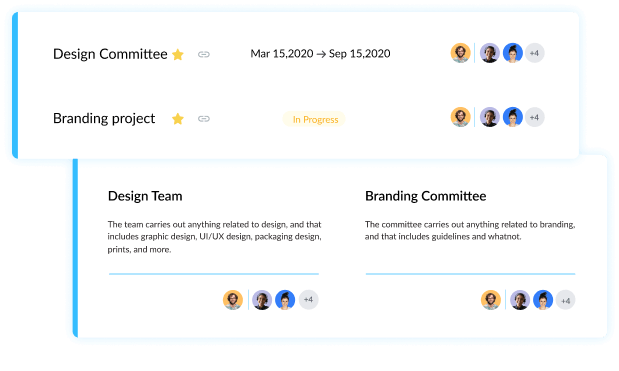
2. To each of your meetings, add your timed agenda items and subitems. Ask your meeting participants to collaborate on your agenda before the meeting. Then, easily move their suggestions to be a part of the meeting agenda.
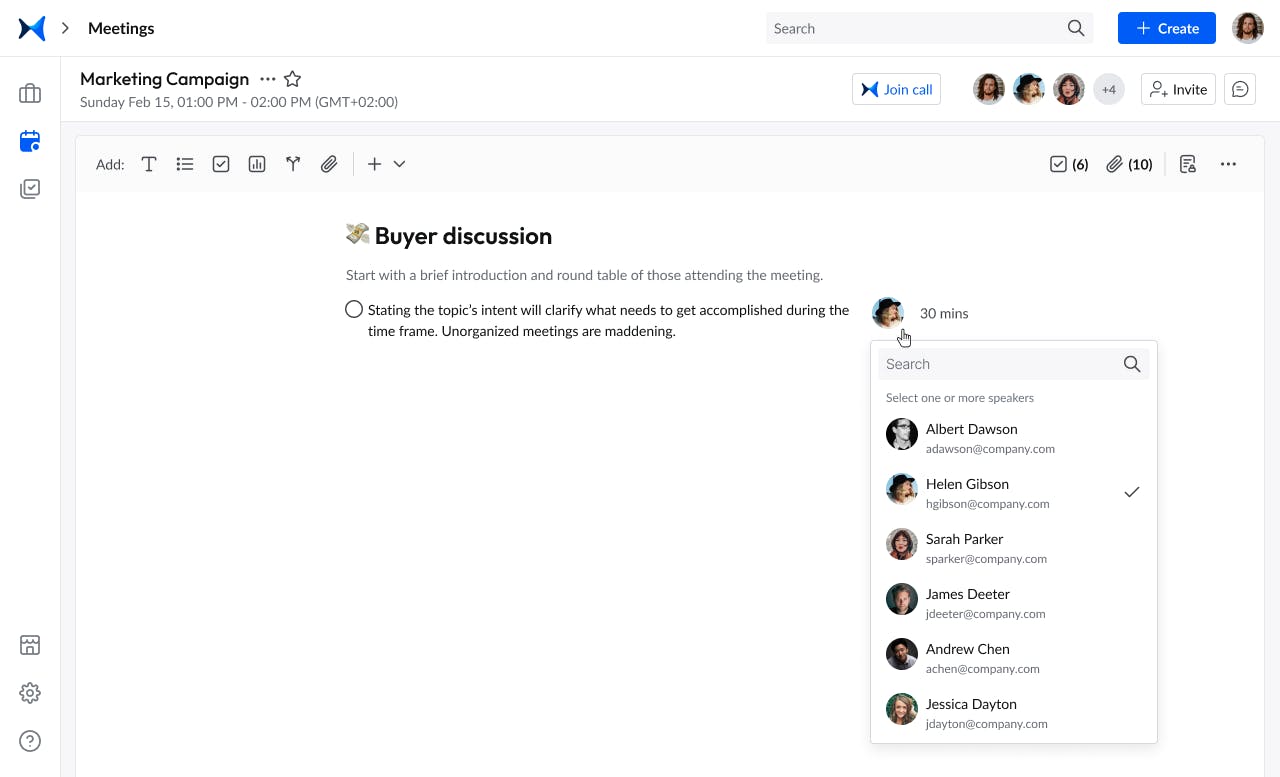
3. You can upload all the materials you'll need before your meeting and invite your participants to pre-read them to come prepared. adam.ai integrates with Google Drive, Dropbox, and Box to manage your work all in one platform.
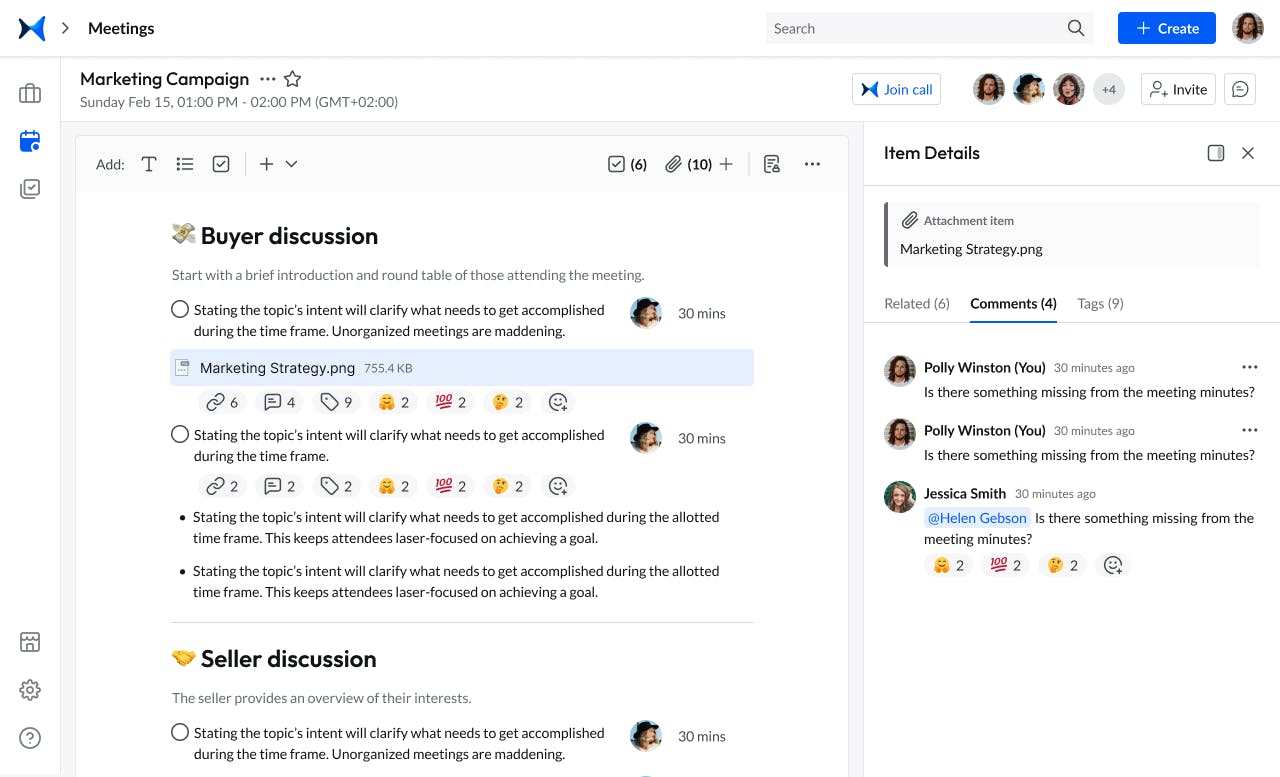
4. Add relevant meeting links to your current meeting. For example, you are running a one-on-one meeting every month with your new employee, and you need to review previous feedback or any notes you've written during such meetings. You can link those relevant meetings to easily access them during your meetings.
5. Write notes in real time in private or public.
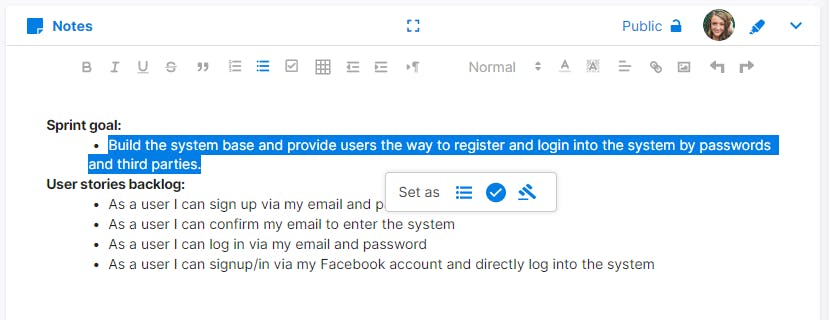
6. Add your action items with assigned people, watchers, deadlines, descriptions, and attached files, and then send them off to your favorite project management tool when you integrate it with adam.ai.
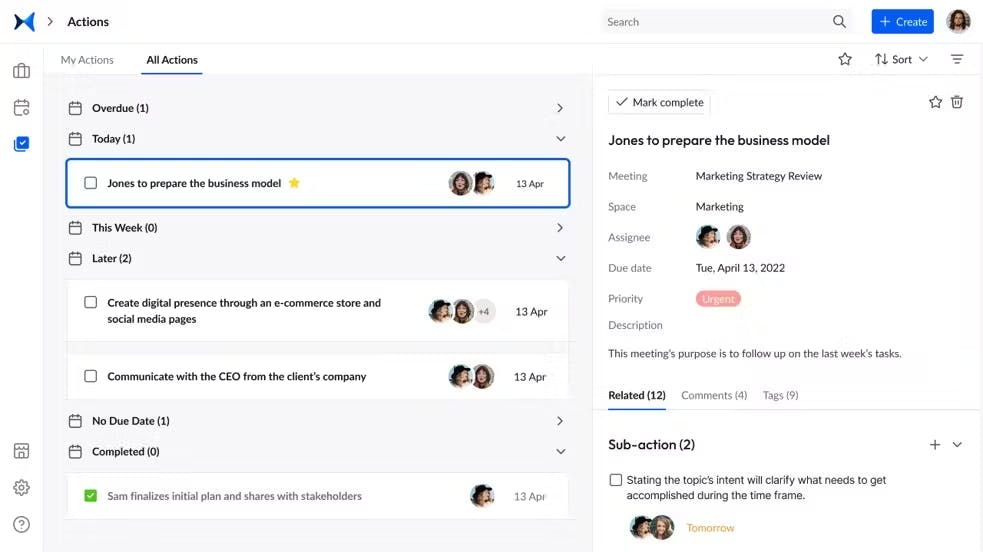
7. Your meeting minutes are automatically generated. They include the meeting agenda, meeting notes, attendance, votes, and all action items and their deadlines.

9. If you need to run daily standups for regular check-ins, create several meeting series that can be repeated daily.
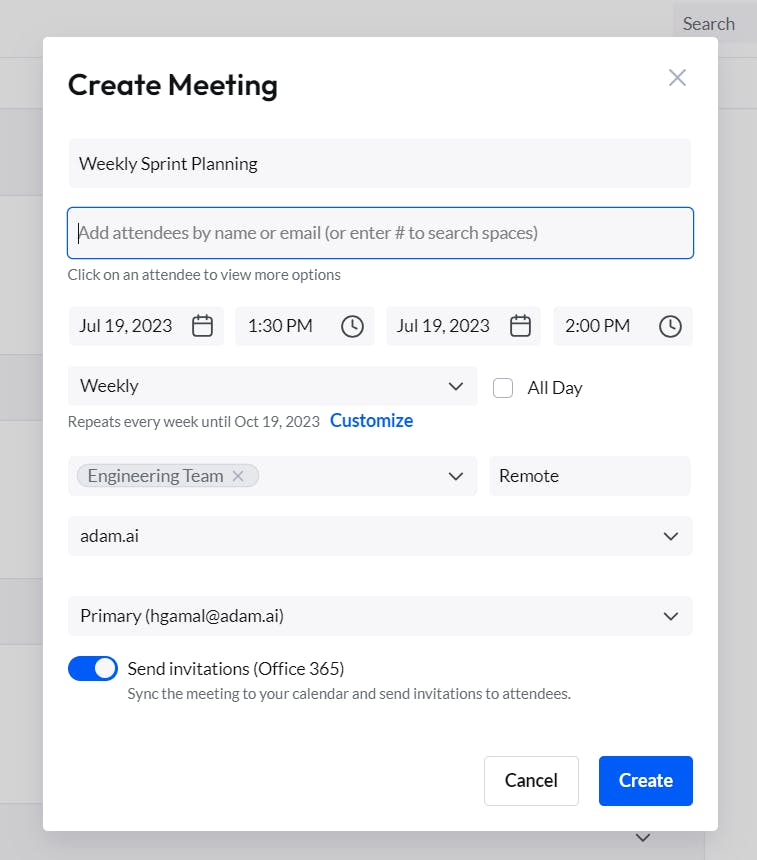
Get started right now and experience the true meaning of all-in-one meeting management.
Transform how you conduct critical meetings—From meticulous preparation to effective execution and insightful follow-up, adam.ai integrates comprehensive analytics, full customization, and intuitive interfaces with powerful meeting management tools.
Easy onboarding. Enterprise-grade security. 24/7 dedicated support.
You may like to check these articles on meetings you'll need to run as chief of staff:
Chief of staff job description
To get an idea of how companies seek to recruit a chief of staff and what they need in their chief of staff, we've selected several examples of the chief of staff's job descriptions, so you can explore chief of staff experience requirements, education, and prior work experience.
1. Source: ZipRecruiter
Job summary: chief of staff
We are seeking a Chief of Staff to coordinate and manage the essential activities of our business, making strategic plans to ensure all business functions are efficient and at their most productive. The ideal candidate will advise on projects and is the main organizer and planner of company initiatives, attending to the minute details while staying attuned to the macro vision of business operations.
As Chief of Staff, you will work with and report directly to the CEO, relaying messages and ideas from other senior executive leaders to improve the internal functions and processes of the company. You must be a creative and results-driven thinker and an excellent problem solver; possess incredible interpersonal skills to effectively manage staff; and act as the central contact for all business communications.
Duties and responsibilities of chief of staff
- Organize and coordinate staff functions and activities
- Coordinate strategic business initiatives and guide to completion
- Supervise daily operations and help oversee projects of high importance
- Act as a main consultant to the CEO
- Manage company calendar and ensure deadlines are being met
- Work with and/or lead cross-functional teams
- Be a liaison for staff, chief executives, department leaders, and CEO
- Assist CEO with internal communication, meeting with HR leaders and attending to staff needs, ensuring any problems are resolved
- Keep CEO abreast on current company climate (employee wellbeing, project statuses, new proposals, etc.)
- Work with team leaders and present to senior executives
- Build strong relationships with employees and oversee their progress, noting any issues or successes
- Help coordinate business-wide procedures and work to improve existing processes for maximum clarity, efficiency, and success
- Attend executive meetings and deliver progress reports to CEO
Requirements and qualifications for chief of staff
- Excellent oral and written communication skills
- Experience in consulting and operations
- Strong interpersonal skills and a knack for productive collaboration across varying departments
- Detail-oriented and data-driven
- Able to successfully organize, lead, and direct large teams of people
- Possess an encouraging, can-do attitude
- Effective manager
- Impeccable time management and multi-tasking skills
- Business-minded and a strategic planner
- Proven problem solver who can make clear-headed decisions while under pressure
- Ability to analyze and compile large sets of data and present effective reports
- Highly experienced with project coordinating and management
- Self-motivated and self-sufficient
- Bachelor’s degree in Business Management or related field; MBA preferred
- 10+ years’ experience in a leadership/management role
- Proven creative thinker with strong business acuity
2. Source: LinkedIn Talent Solutions
Chief of staff: job description
At [CompanyX], we’ve experienced a wonderful period of growth as the direct result of increased efficiency and productivity. To continue on this trajectory, we’re searching for a highly qualified chief of staff to work closely with our executive team.
From day one, the chief of staff will have an immediate impact on our productivity, streamlining strategic initiatives, overseeing program management, and communicating objectives between departments.
The ideal candidate will have proven experience in a business management role, with a special focus on executive-level advising and interdepartmental collaboration.
Objectives of the role of chief of staff
- Oversee strategic business initiatives from development through successful execution under the guidance of senior leadership and departmental heads
- Assist and communicate with executives in decision-making, program management, and initiative implementation
- Review, design, and execute improvements to org structure, find knowledge and skills gaps, and help address them
- Improve current processes and coordinate organizational procedures for optimized efficiency and productivity
Daily and monthly responsibilities of chief of staff
- Serve as liaison between staff, executives, senior leaders, and CEO, regarding company climate, employee well-being, project updates, proposals, and planning
- Assist the human resources department with new hires, including documentation and onboarding, and collaborate to address and resolve all employee concerns
- Oversee daily operations through collaboration with senior management and department leaders, performing an array of administrative tasks from managing calendars, generating correspondence, maintaining hard copy and electronic files, planning, and coordinating annual corporate meetings, and scheduling facilities
- Build and develop relationships with all employees for increased efficiency and effective responsiveness into existing operations, and help to define new operational strategies, working with CEO and executives on special projects
- Serve as a subject matter expert, handling inquiries and developing action plans to address them, and assisting with the preparation and dissemination of communications
Skills and qualifications of chief of staff
- Master’s degree in Business Administration or similar field
- 7+ years in a business or executive management role
- Proven experience organizing and directing multiple teams and departments
- Excellent communicator in written and verbal form
- Extremely versatile, dedicated to efficient productivity
- Experience planning and leading strategic initiatives
Preferred qualifications for chief of staff
- Experience with data analysis
- Experience with budget management
- Consulting experience with a focus on operations management
- Proven success in a project coordination role
- Nimble business mind with a focus on developing creative solutions
- Strong project reporting skills, with a focus on interdepartmental communication
3. Source: Indeed
Chief of staff duties and responsibilities
- Collaborating with executive team members to determine and prioritize business strategies
- Managing the chief executive’s schedule, scheduling meetings, and planning travel
- Providing department leaders with recommendations and consultation to improve teamwork
- Planning, coordinating, and keeping content of a meeting focused
- Determining key performance indicators and how to measure team performance
- Providing tactical support to implement ideas
- Working with leadership to deliver, monitor, and communicate progress towards goals
- Responding to inquiries on behalf of the chief executive
- Overseeing strategic business initiatives from ideation to implementation
- Identifying and helping solve core problems or opportunities within business processes
- Providing the chief executive and other senior leaders with insight and analysis on the company’s operations
- Assessing risk when business decisions are made
- Providing support and oversight for special projects and initiatives
- Planning, coordinating, and leading meetings and workshops
- Identifying and providing recommendations on improvements across the organization
Chief of staff salary expectations
Salary may depend on several factors, such as educational background, level of experience, and geographical location.
Here is what we found out:
According to Indeed, the most updated average base salary per year is $103,813, with profit sharing $20,000 per year.
According to Glassdoor, the average base salary per year is $143,771, with the lowest total pay being $114K and the highest being $252K. Total pay includes $20,347 per year, which can be a cash bonus, commission, tips, and profit sharing.
The bottom line
The role of a Chief of Staff involves facilitating the creation and implementation of strategic plans, gathering information to help CEOs make sound decisions, and much more. Each company has a unique CoS role with varying levels of responsibility. However, the common duty is to help make a CEO more focused and productive.
One of the greatest benefits a CoS can introduce to a company is the successful management of the organization’s most senior leadership team meetings from preparing the agenda and managing the right type of dialogue to helping the team make decisions.
And to succeed in such a task, a CoS needs all the help they can get. Today, technology offers incredible meeting management solutions.
And while there may be multiple meeting management solutions available, here is why adam.ai is the all-in-one meeting management platform you can trust:
- adam.ai is one of Atlassian Ventures' portfolio companies.
- In the meeting management software category on G2, adam.ai has been ranked a leader and a high performer for successive quarters in the past years.
- adam.ai has been included in the Forrester Report in the AI-enabled meeting technology landscape.
- adam.ai is trusted and used by powerful teams and organizations worldwide for all types of critical meetings, like board, committee, project management, and business development meetings.
- And most importantly, adam.ai integrates with your existing workflow, is SOC2 compliant, provides dedicated support and success, and has a free trial option.
Subscribe to adam.ai blog
Stay ahead with the latest insights—get our newest blog posts, tips, and updates sent straight to your inbox.